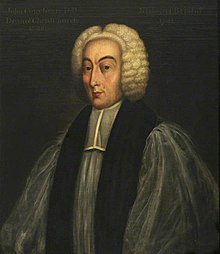John Conybeare (original) (raw)
From Wikipedia, the free encyclopedia
English Bishop and academic
| The Right ReverendJohn Conybeare | |
|---|---|
| Bishop of Bristol | |
 |
|
| Diocese | Diocese of Bristol |
| In office | 1750–1755 |
| Predecessor | Joseph Butler |
| Successor | John Hume |
| Personal details | |
| Born | (1692-01-31)31 January 1692 |
| Died | 13 July 1755(1755-07-13) (aged 63) |
| Nationality | British |
| Denomination | Anglican |
| Alma mater | Exeter College, Oxford |
John Conybeare (31 January 1692 – 13 July 1755) was Bishop of Bristol and one of the most notable theologians of the 18th century.
Conybeare was born at Pinhoe, where his father was vicar, and educated at Exeter Free School, Blundell's School and Exeter College, Oxford. He was elected a Probationary Fellow of Exeter College in 1710, took his B.A. degree in 1713 and was appointed a year later as Praelector in Philosophy.[1]
On 27 May 1716 Conybeare was ordained as a priest by the Bishop of Winchester, Sir Jonathan Trelawney and took a curacy in Surrey.[1] He returned to Oxford a year later and became a well known preacher.
His subsequent appointments included:
- Rector of St Clement's Church, Oxford, 1724
- Senior Proctor, Exeter College, Oxford, 1725
- Elected Rector of Exeter College, Oxford, 1730
- Dean of Christ Church, Oxford, 1733
- Bishop of Bristol, 1750[2]
Conybeare was known for the publication of his book Calumny Refuted, an answer to the personal slander of Dr. Richard Newton.
Conybeare was the father of Dr William Conybeare, the well known rector of Bishopsgate, and grandfather to the Anglo-Saxon translator and poet John Josias Conybeare and the geologist William Conybeare. He is buried in Bristol Cathedral.
- A Defence of Revealed Religion Against the Exceptions of a Late Writer in His ntituled Christianity As Old As Creation, against Matthew Tindal, 1732
- Calumny Refuted: Or, An Answer To The Personal Slanders Published By Dr. Richard Newton, Published for J.J. and P. Knapton [etc.] (London), against Richard Newton, principal of Hart Hall, Oxford, 1735[2]
| Academic offices | ||
|---|---|---|
| Preceded byMatthew Hole | Rector of Exeter College, Oxford 1730–1733 | Succeeded byJoseph Atwell |
| Preceded byWilliam Bradshaw | Dean of Christ Church, Oxford 1733–1755 | Succeeded byDavid Gregory |
| Church of England titles | ||
| Preceded byJoseph Butler | Bishop of Bristol 1750–1755 | Succeeded byJohn Hume |
- ^ a b Banks, M. L. (1904). "Blundell's Worthies". Chatto & Windus. p. 51. Retrieved 12 May 2019.
- ^ a b Stephen, Leslie (1885). "Conybeare, John (1692-1755)". wikisource. Smith, Elder & Co. Retrieved 11 May 2019.